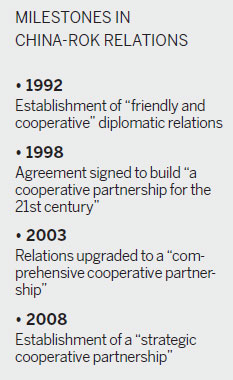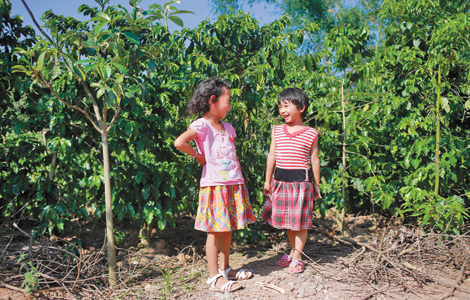Park's visit could pave way for nuclear talks
Updated: 2013-06-27 09:02
(China Daily)
|
|||||||||||

Republic of Korea President Park Geun-hye's ongoing visit to China is historic in terms of building trust and paving the way for strategic discussions that can ease tensions on the Korean Peninsula, said ROK Foreign Minister Yun Byung-se recently.
Yun made these remarks during a luncheon meeting in Seoul with former Chinese State Councilor Tang Jiaxuan that was held as a prelude to the presidential visit, which is scheduled for June 27 to 30.
During the meeting, Yun and Tang exchanged views on the significance of the visit and the state of bilateral relations as well as the situation on the Korean Peninsula and in Northeast Asia.
The two countries need to be well prepared to adopt a joint statement that includes a roadmap for a new bilateral relationship, Yun said.
Echoing Yun's view, Tang said Park's visit is a highly significant event in the history of Chinese diplomacy and reflects changing circumstances. He added that all relevant Chinese ministries have made thorough preparations.
Yun and Tang expressed certainty that the relationship between the nations will reach new heights based on the implementation of a shared vision for the future, which will be devised during the summit.
Compared to other neighboring countries, the ROK shares more common interests with China, Tang said, and relations between the two have the greatest potential for development.
Yun predicted that the focal point of relations will remain on the economy and strategic diplomacy as the two sides work together to develop a closer, more cooperative relationship, extending beyond the two countries and the Korean Peninsula to the regional and international stages.
The two sides agreed to cooperate more closely to realize the common dreams of China, the ROK and Asia.
One of the three elements of China's Korean Peninsula policy is de-nuclearization, Tang said. He said the country's highest priority is maintaining peace and stability in the region by resolving issues through dialogue and negotiation.
He also said that China supports Park's "trust-building process on the Korean Peninsula" and "the Northeast Asia Peace and Cooperation Initiative", adding that China has much interest in a three-way dialogue with the US and ROK.
Commenting on the need to make use of DPRK's recent change of attitude, Tang said he is optimistic that the ROK will start a dialogue with the DPRK and that relations would improve. Yun expressed appreciation to the Chinese government for supporting the ROK government's policy and its continuing efforts to persuade the DPRK to come to the table.
The minister also said that the ROK government shares China's view that DPRK's goal of simultaneously pursuing nuclear arms and economic development cannot be achieved. He said that the ROK sincerely wants to make progress toward de-nuclearization through these dialogues.
He said he hopes that the ROK and China will continue to cooperate closely for a meaningful and sustainable reduction of tensions with the DPRK.
While China is pursuing a new type of great power relationship with the US, the ROK is also rethinking relations with its neighbor to the north as well as with other nations in Northeast Asia, Yun said.
He termed the national strategy "trustpolitik" and said it involves a process of building trust on the Korean Peninsula and in the region.
In response, former State Councilor Tang said that China will continue to closely consult with the ROK on DPRK issues.
(zhuanti@chinadaily.com.cn)
Today's Top News
Mandela still critical, Zuma cancels trip
Rudd returns as Australian PM
Door opens on better homes for poor
Long lost weekend
Space dream closer to reality
Crime on the rise with new synthetic drugs
Prices climb as police crack down
Park sees blueprint for ties
Hot Topics
Lunar probe , China growth forecasts, Emission rules get tougher, China seen through 'colored lens', International board,
Editor's Picks

|

|

|

|

|

|





